Culture
On a caravan, with one of the Sahara’s last European explorers

Climbing into the saddle, he adjusts the scarf protecting his head from the sun and, with a tap on the camel’s back, the caravan sets off.
Thierry Tillet is again off to explore the vast Saharan desert, at the head of a nine-camel convoy with three other riders.
At 68, the Frenchman is one of the last European explorers since the end of the 19th century to dedicate much of his life — 47 years — to crisscrossing the Sahara.
This expedition, which began before the coronavirus epidemic, starts and ends at two desert jewels in central Mauritania.
From Tichitt, the convoy is headed east to Oualata, 300 kilometres (185 miles) away, travelling in single file over a sandy, rocky landscape.
For the first time, Tillet — or Ghabidine, as a Tuareg friend renamed him — is taking journalists along “so that this knowledge reaches the general public”.
Perched on the back of his swaying camel, Tillet wears an old, holey T-shirt and worn sandals.

With his tousled, white hair and stubbled chin, it’s easy to forget he’s an authority in his field.
For many years he was a member of the anthropology laboratory at France’s National Centre for Scientific Research (CNRS).
He was also professor of prehistoric archaeology at Grenoble University and taught in Chad, Niger and Mali.
Throughout, he would go back and forth to the Sahara.
He has documented Neolithic civilisations, overseen the inventory of Malian archaeological sites and discovered a dinosaur skeleton in the Tenere desert in Niger.
“Sometimes, small fragments of discovered tools contain more information than a dinosaur, even if it’s less spectacular,” Tillet says.
In all its diversity
Exploring the history of the world’s largest expanse of arid land is a hugely diverse venture.
It can range from the forgotten religious centres of Sufi brotherhoods in northern Mali, to the sandstone plateaus in northeastern Chad and prehistoric Saharan settlements in Niger.
But trading his camel for the comfort of an air-conditioned vehicle as his mode of transport isn’t an option for Tillet.
“You’re going at the speed of the camel, and that allows me to observe and spot a number of things on the ground,” he says.

“In a car I wouldn’t be able to do that, it moves too quickly.”
Each trip brings something new, be it publications in scientific works, “a few stones brought back for research” or photos of objects from the Neolithic era, the last period of the Stone Age.
Currently it’s an 11th-century caravan depot lost in the Mauritanian dunes, the Ma’den Ijafen, that begs to be found.
“It was Theodore (Monod, the late French explorer) who discovered it in 1956,” Tillet says.
“He asked me to go back there.”
For three years now, he has been searching and, on this expedition, wants to ask around among nomadic shepherds.
The revealing winds
Tillet does not consider himself an adventurer or a daredevil.
“Exploration carries with it a fantasy. I’m not trying to discover the unknown, but to discover what exists!” he says.
“That is true scientific exploration.”
In this part of the Sahara, prehistoric artefacts are everywhere, constantly revealed by an omnipresent wind, but indistinguishable to the untrained eye.
“In a continental climate, it’s often necessary to dig… Here, it’s all on the surface.”

Without warning, he pulls the reins to stop, on spotting something interesting.
If he doesn’t know what it is, he takes notes and — in his only recourse to 21st-century technology — satellite coordinates using a GPS.
Once home in southwestern France’s Perigord region, he will transfer them onto a map, tirelessly completing what he calls his “spider’s web”.
The hundreds of GPS points are not only a scientific record but suggest the route of his next expedition.
Searching for a bull
Tillet, the son of Parisian bakers, said his love of Africa and archaeology began after hearing stories as a child.
But it was his first university professor who ignited the desire to go and see it for himself, encouraging him to focus on the Sahara.
On his first trip — in Algeria — it rained a lot.
“For someone wanting to study the Sahara, it was a bad start!” he says, laughing.
Tillet’s wife occasionally used to accompany him on his explorations.
But this time, his companions are Ahmadou, Sheih and Ahmed, whom he has known for many years.
Looks, gestures and common phrases in mixed mother tongues make up for any language barriers.
The days are punctuated by the same rituals: a sunrise departure, stops to drink green tea and finding a place where they can make supper before sleeping under the stars as the camels graze.

After two days, the caravan stops at Akreijit, an archaeological site discovered in 1934 by Monod and partly restored by a French team at the end of the last century.
The foundations of the old buildings are visible again.
European tourists disembark from their 4x4s in a cloud of dust and briskly visit the old town, just last year removed from the “red zones” where the French foreign ministry advises against travel.
Tillet looks for a drawing of a bull on a rock, located during a previous visit.
“It is two metres (6.5 feet) long,” he says. “My GPS point tells me it’s in 22 metres.”
He scans and searches, passing repeatedly through the ruins, but finds nothing.
‘At great risk’
Concerned about kidnappings, the French authorities are not always happy about the caravan’s off-the-radar trips.
“These people are as worrying as they are fascinating, so we have to keep an eye out,” a French diplomat in the sub-region later told AFP.
Three-quarters of the caravan’s route are in areas that travellers are officially advised by the French government to avoid.

“Objectively, he sometimes puts himself at great risk,” acknowledged Pierre Touya, president of the Association of Saharans which groups archaeologists, geographers and other enthusiasts.
Still, “he remains rational, does very good research and is supported by local knowledge,” he said.
On-the-ground information from locals is key to Tillet’s preparations before leaving.
By email and phone, he finds out about nomadic tribes’ movements or where there are wells for the animals to drink.
For decades, the region has been buffeted by inter-communal clashes, separatist insurgencies and conflicts between religious groups — and Tillet has often found himself on the front row.
In the 1990s, he met Iyad Ag Ghaly, then a rebel leader and now head of one of the main jihadist coalitions.
He also met French ethnologist Francoise Claustre in Chad before she was kidnapped in 1974 by Hissene Habre’s rebels.

And he has shared mechoui, a meal of slow-roasted lamb, with former Malian president and fellow archaeologist Alpha Oumar Konare.
“As long as I don’t bump into the bastards, it’s all right,” he smiles, talking about the jihadists, who are an escalating threat in the Sahel region.
In 2009, he was forced to hide in the northern Malian town of Kidal.
Alerted to the presence of “likely unfriendly” groups at a time when Tuareg independence rebellions and jihadist groups were emerging, he left at 4:00 am in a pick-up truck, his head down and face hidden.
That same year, he and his camel team were woken in the night by the blinding light of a surveillance drone in the desert of Mali’s Taoudenit region.
The jihadist expansion in the Sahel-Saharan strip has reduced exploration possibilities.
But, according to a source close to the authorities, interviewed in Mauritania’s capital, Nouakchott, a security grid set up a decade ago to counter the emerging jihadist influence is “once again allowing scientists and tourists to come”.
‘So much to document’
It’s day four and, after a cold night, he groans from the pain of an old foot injury as he climbs into the saddle.
But, neither the discomfort nor deteriorating regional security will stop him.

This desert is “the place where I feel the best, where you can’t go wrong”, he says.
When he reaches Oualata near the Mali border after what will have been a two-week journey, Tillet plans to relax and drink tea with an old acquaintance.
Even if he didn’t find the elusive caravan depot this time, he’s happy with the information gleaned.
Previously the projects were funded by his former employer, the CNRS, but since retiring in 2012, he pays the several thousand euros needed for the trip himself.
Monod got off his camel for the last time aged 93 and Tillet, a member of the French Society of Explorers, hopes to go on for a long while yet.
“There’s still so much to document,” he says.
For next year he is planning his longest route so far, at more than 1,000 km, back in the Sahara, with its many silences but, as he says, “where it’s never boring”.
Reporting and photos: AFP
Culture
Kuda Villingili presents family-focused Eid al-Fitr experience in Maldives
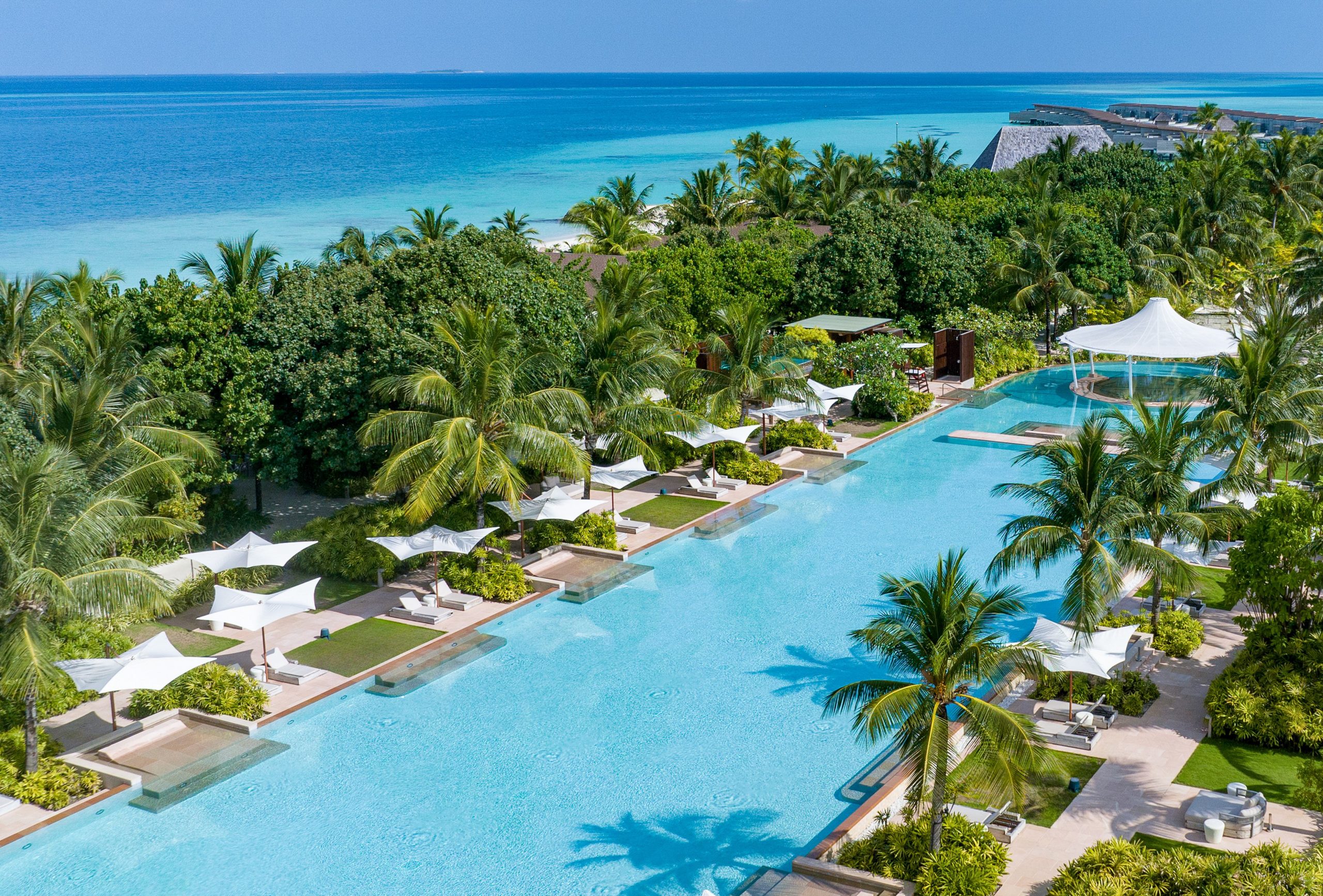
Kuda Villingili Resort Maldives has announced a three-day Eid al-Fitr 1447 AH programme, inviting guests to celebrate the occasion from 19 to 21 March 2026 in a tranquil island setting that brings together family, reflection, and shared moments.
Following the holy month of Ramadan, Eid al-Fitr at the resort is designed as a gentle transition into celebration, offering guests the freedom to mark the festival at their own pace. The programme brings together families, couples, and friends through curated dining experiences, relaxed island gatherings, and moments of quiet connection by the Indian Ocean.
Culinary experiences form the centre of the Eid programme. Celebrations begin with the Kuda Eid Feast Buffet Dinner at The Restaurant, featuring Middle Eastern and Maldivian dishes served under the stars, accompanied by soft island music. Guests can also gather at Spice for the Kuda Eid Lunch Feast, a five-course Middle Eastern fusion menu by the Qureshi brothers, inspired by traditional flavours and designed for sharing in the spirit of Eid. Evenings continue at The Bar with an Arabic Shisha Night, combining live DJ music with a relaxed social atmosphere.
Eid mornings at the resort offer a calmer start to the day, with a Signature Floating Breakfast served in the privacy of each villa pool. Guests can also enjoy Eid Signature Mocktails, created with floral and spice notes that reflect the season’s sense of gratitude and renewal. An interactive Art of Shisha Making experience is also available, encouraging conversation and shared storytelling.
The Eid programme has been curated to include guests of all ages. Younger visitors are welcomed at Kuda Fiyo, where Eid-themed creative workshops, treasure trails, storytelling sessions, games, and movement activities are organised to create memorable experiences while reflecting the cultural significance of the occasion.
For families and adventure-seekers, the resort also offers Eid al-Fitr Ocean Adventures. A personalised Big Game Fishing experience provides an opportunity to spend time together on the open sea, combining quiet reflection with exploration of the surrounding waters.
With its expansive island layout, eight dining destinations, and the Maldives’ largest swimming pool, Kuda Villingili Resort Maldives presents an Eid al-Fitr celebration that blends tradition with contemporary island living, offering space, privacy, and a relaxed setting for guests seeking a meaningful Eid experience in the Maldives.
The full Eid al-Fitr 2026 programme can be viewed here. More information about the resort is available from the resort’s website.
Culture
SO/ Maldives illuminates Diwali with culinary delights, festive spirits, chic island vibes
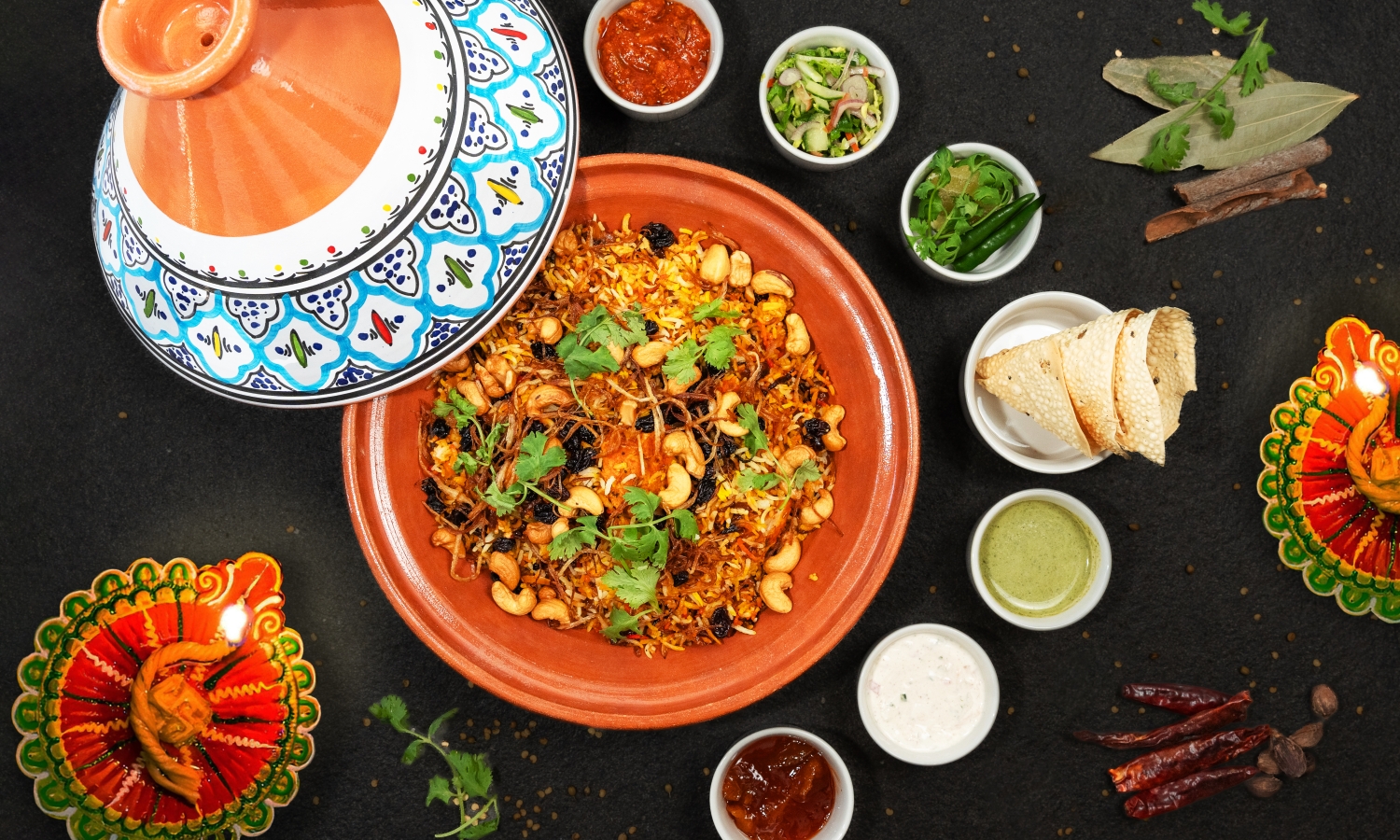
This Diwali, SO/ Maldives is set to dazzle with a bold celebration that blends cultural tradition with the resort’s signature flair. Guests are invited to indulge in a day of flavor, music, and style, wrapped in the spirit of light and festivity.
The day begins at The Citronelle Club, where guests can immerse themselves in India’s sweetest traditions with a complimentary Gulab Jamun cooking class. This hands-on session not only celebrates the art of crafting one of India’s most iconic desserts but also offers guests a memorable experience of cooking and tasting together in true festive spirit.
Following the workshop, the culinary journey continues with an exclusive tasting of SO/ Maldives’ brand-new Indian à la carte menu. Bursting with bold flavors and modern interpretations, this exciting menu brings a fresh twist to traditional favorites, showcasing dishes designed to delight both seasoned gourmands and those discovering Indian cuisine for the first time.
As the afternoon rolls into evening, the celebrations flow seamlessly to Lazuli Beach Club and The Citronelle Club, where guests can savor the moment with 40% off select premium beverage bottles. Whether shared over a meal or enjoyed as a toast to togetherness, these indulgent pours elevate the festive mood with sophistication.
The evening comes alive with a vibrant lineup of cultural and family-friendly activities. Guests can express their creativity at a Family Diya Workshop, lighting up the night with personalized clay lamps that symbolize joy and prosperity. At Lazuli Beach Club, a Henna Workshop invites guests to adorn their hands with intricate patterns, while the beachfront transforms into a canvas for a Rangoli experience, where colorful designs bloom in the sand to celebrate the artistry and spirit of Diwali.
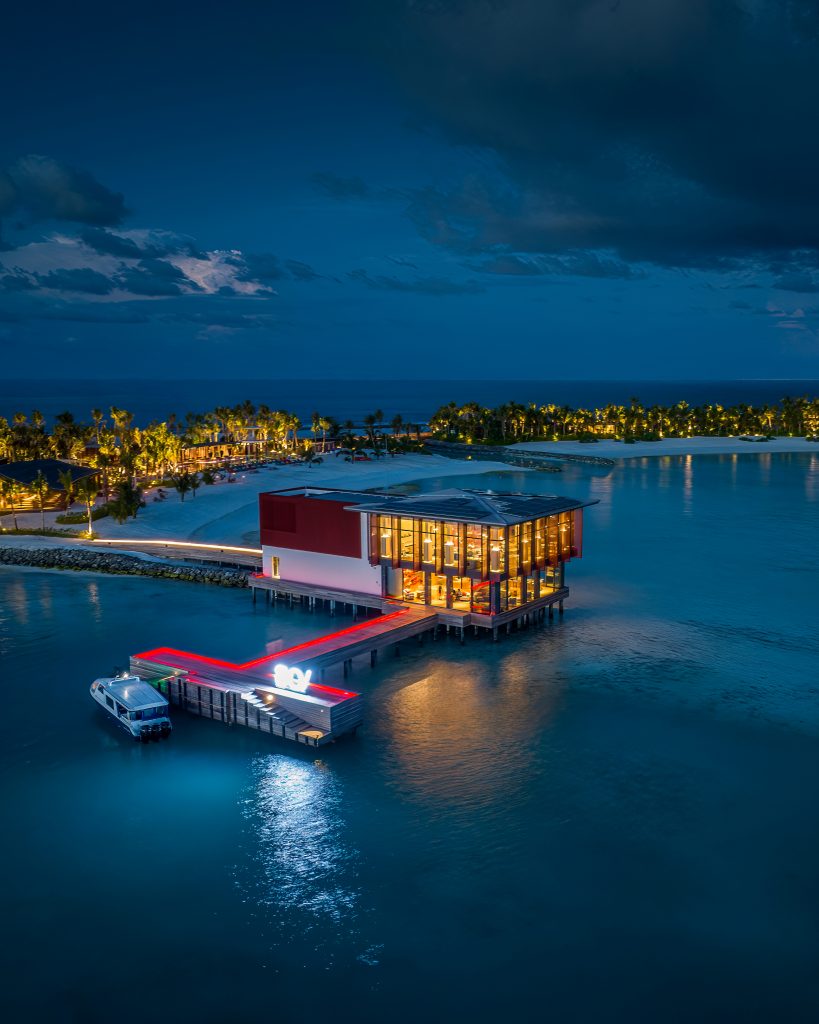
No Diwali celebration is complete without a golden-hour glow. At Lazuli Beach, the festivities shine brighter with 50% off saffron martinis during sunset, accompanied by live DJ beats. As the Maldivian sky turns to hues of orange and gold, guests can sip, sway, and soak in an electric yet elegant atmosphere, perfectly in tune with the spirit of Diwali.
“At SO/ Maldives, we reimagine cultural celebrations with a bold, chic island twist. This Diwali, we’ve curated a day that’s all about indulgence, flavors, music, and unforgettable moments,” said Olivier MOIES-DELVAL, General Manager, SO/ Maldives. “It’s about honoring tradition while celebrating in style, surrounded by the natural beauty and energy of the Maldives.”
SO/ Maldives invites guests to light up their Diwali with this one-of-a-kind experience that blends the richness of Indian traditions with the resort’s signature playful luxury.
Celebrate light, flavor, and island chic this Diwali at SO/ Maldives.
Cooking
Malaa – The Maldivian Café: NH Kuda Rah’s new culinary jewel
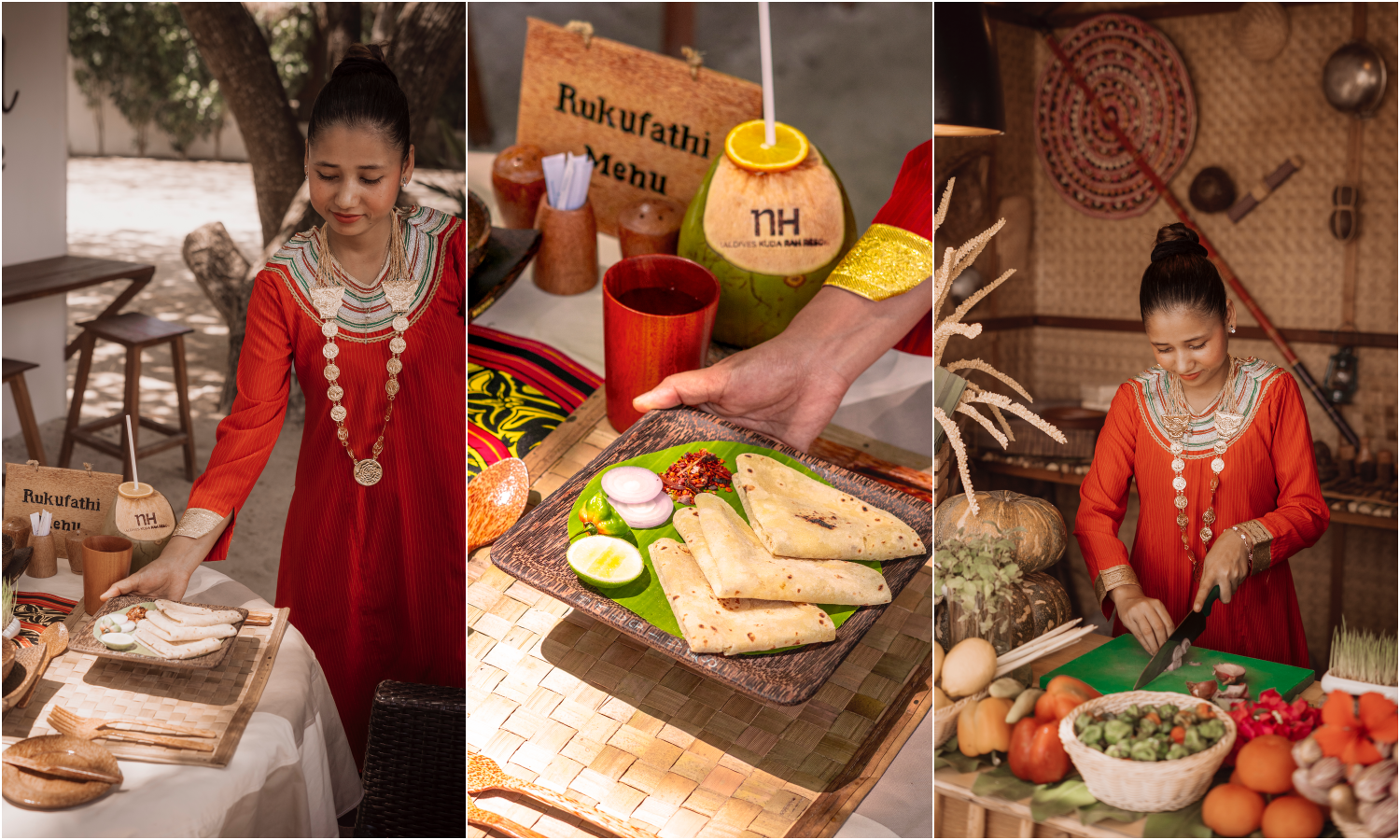
NH Maldives Kuda Rah has announced the launch of its newest food and beverage outlet, Malaa – The Maldivian Café. Now open to guests, the café offers a taste of authentic Maldivian cuisine alongside interactive Maldivian cooking classes.
Guests staying at NH Maldives Kuda Rah can delve into the country’s rich culinary traditions with guidance from award-winning Executive Chef Farish Mukhthar. With over 22 years of experience in the hospitality and culinary industries across five-star and ultra-luxury resorts in the Maldives, Chef Farish brings a deep-rooted passion and refined expertise to the resort. Trained under renowned European celebrity chefs, he has earned a strong reputation for his culinary artistry.
The café focuses exclusively on authentic Maldivian dishes, using locally sourced ingredients from nearby islands as well as the chef’s own garden within the resort. Cooking classes offer guests the opportunity to prepare classic Maldivian dishes, such as curry and local salads, under the guidance of Chef Farish—culminating in a delicious homemade lunch.
As fish (both fresh and smoked) is the staple of the Maldivian diet, it is often prepared with coconut and rice or roshi (Maldivian flatbread). Other traditional ingredients include breadfruit and sweet potato—versatile and starchy staples that feature in a wide range of local dishes. The cuisine is often boldly spiced, with the fiery Scotch bonnet chilli, locally known as githeyo mirus, playing a central role. This essential chilli, along with herbs grown organically in the resort’s garden, imparts a distinctive heat and fruity flavour to many Maldivian dishes.
While many resorts in the Maldives offer a wide array of international cuisine—ranging from Italian and Japanese to French and Indian—the opportunity to savour authentic local flavours can be one of the most memorable aspects of travel. Malaa – The Maldivian Café provides a unique and immersive dining experience for those curious about Maldivian culinary heritage and the fascinating stories behind its traditional ingredients.
This initiative is part of NH Hotels & Resorts’ broader effort to connect guests with meaningful local experiences through its Live Local programme, under the Minor DISCOVERY loyalty scheme. The programme is designed to offer curated, immersive activities and authentic cultural encounters, allowing guests to engage more deeply with their destination.
-

 Action1 week ago
Action1 week agoBestbuy Maldives supports health, wellness as Main Sponsor of MNU Marathon 2026
-

 Cooking1 week ago
Cooking1 week agoMaagiri Hotel invites guests to celebrate Ramadan with daily Iftar
-

 Awards1 week ago
Awards1 week agoEllaidhoo Maldives secures HolidayCheck Gold Award for second consecutive year
-
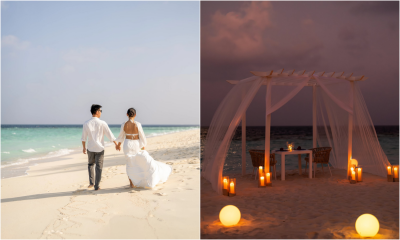
 Love1 week ago
Love1 week agoRomance in nature: Valentine’s week at Eri Maldives
-
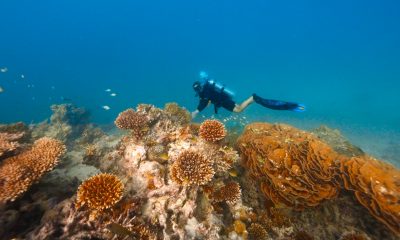
 News7 days ago
News7 days agoVentive Hospitality aligns Maldives portfolio with Green Fins marine sustainability platform
-
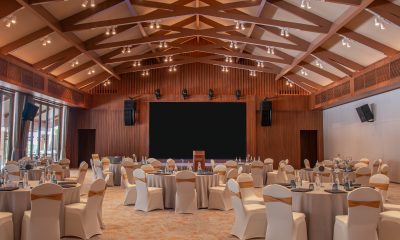
 Business7 days ago
Business7 days agoFeydhoo Hall opens at dusitD2 Feydhoo Maldives as new event space
-

 News5 days ago
News5 days agoThe Ritz-Carlton Maldives, Fari Islands launches conservation programme for environmental observances
-

 Awards1 week ago
Awards1 week agoReethi Faru Resort recognised with HolidayCheck Award 2026









